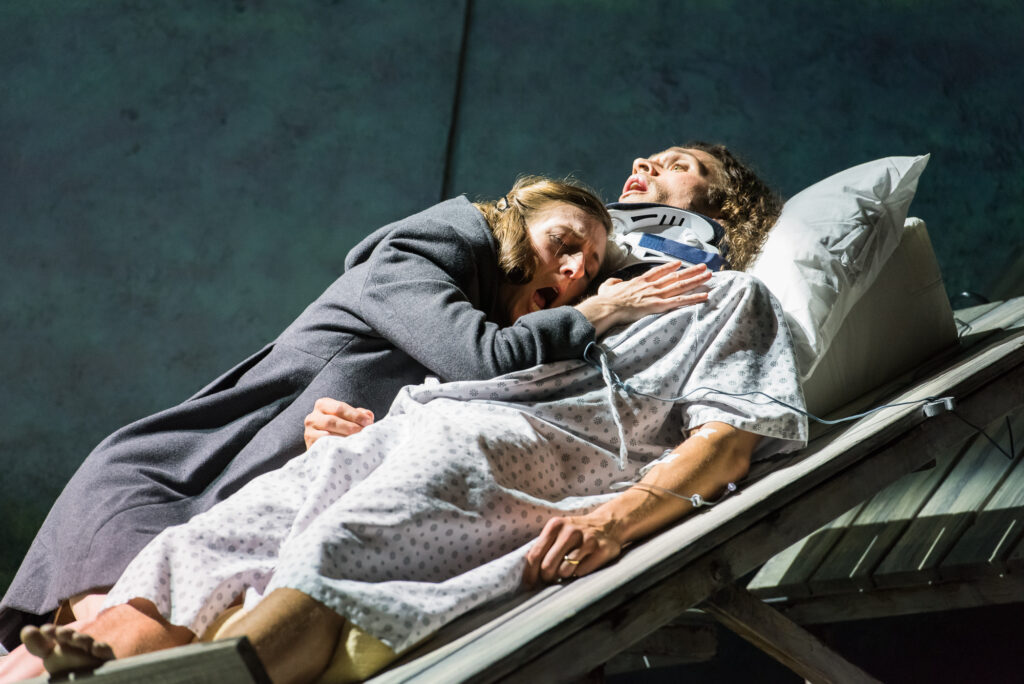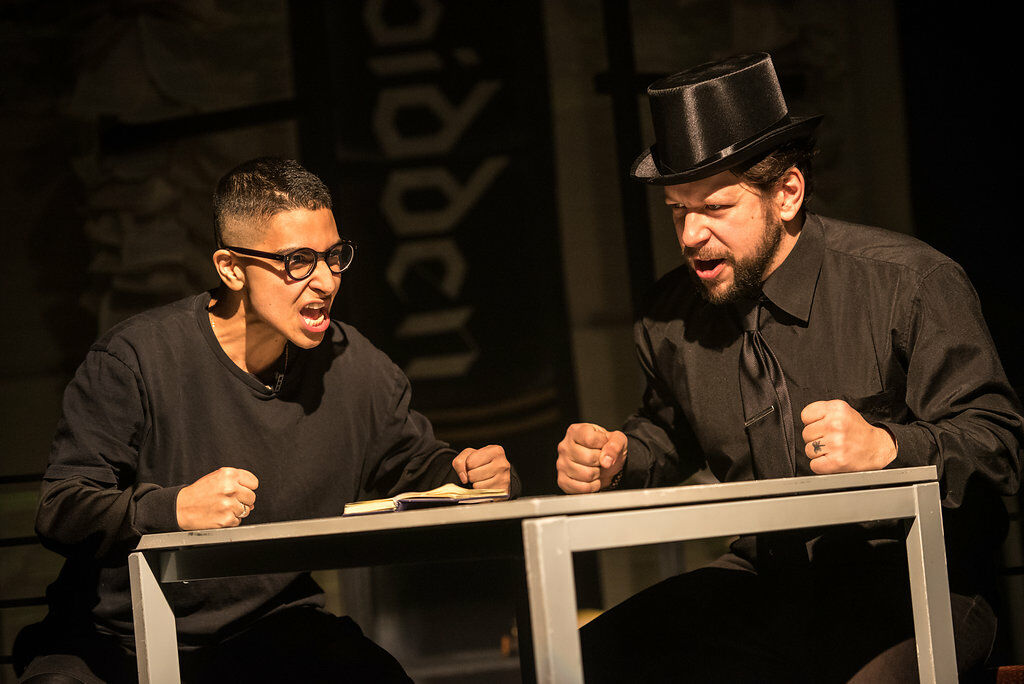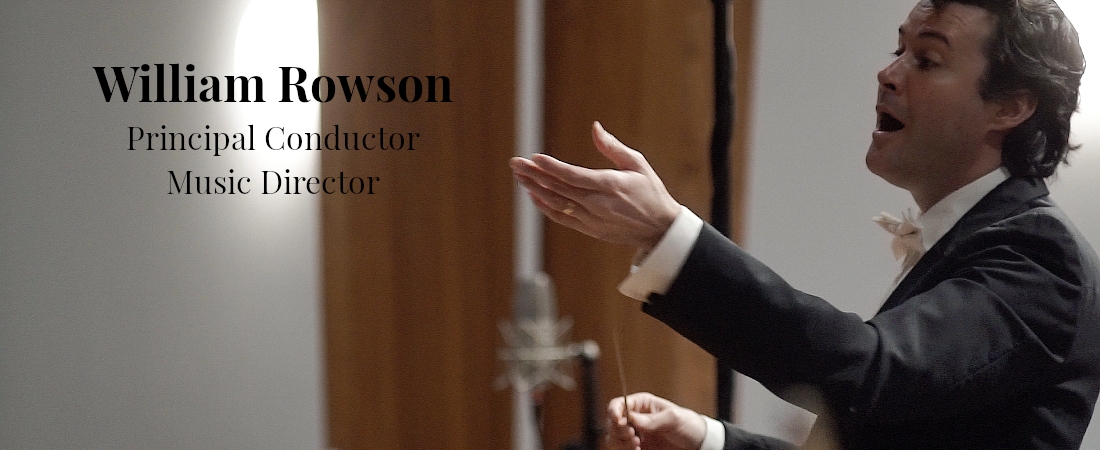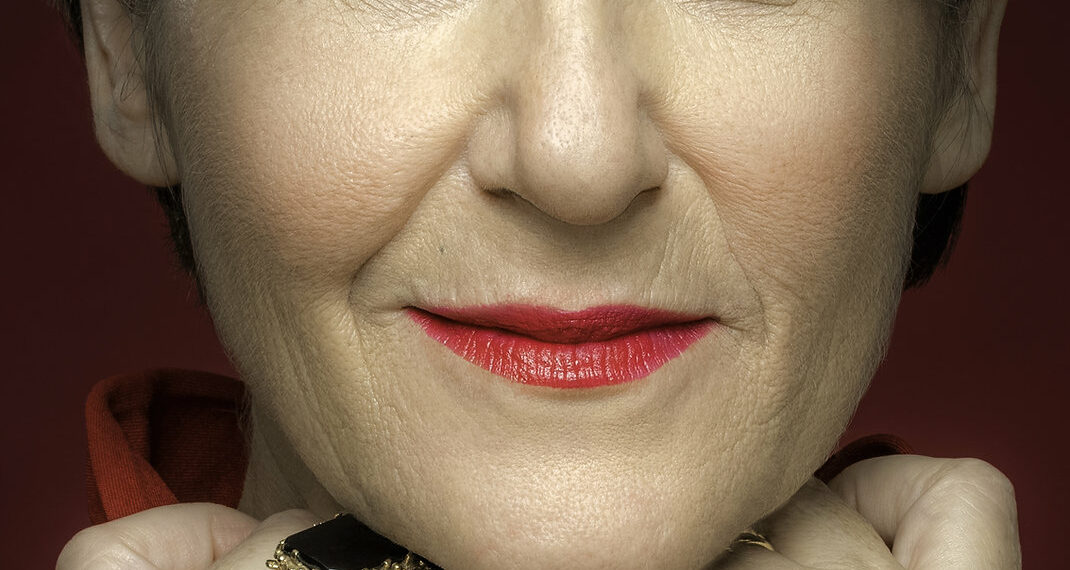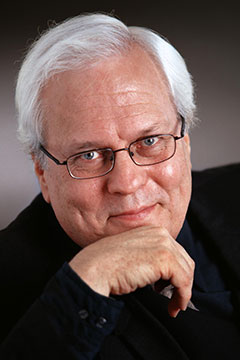Canadian Opera Resource
Canadian Opera Resource
COR
Operas
Content warning: death, injury, paralysis, sexual violence, suicide attempt, violence
Based on the film by Lars von Trier, Breaking the Waves tells the story of Bess McNeill, a religious young woman with a deep love for her husband Jan, a handsome oil rig worker in 1970's Scotland. When Jan becomes paralyzed in an off-shore accident, Bess’s m...
Based on the film by Lars von Trier, Breaking the Waves tells the story of Bess McNeill, a religious young woman with a deep love for her husband Jan, a handsome oil rig worker in 1970's Scotland. When Jan becomes paralyzed in an off-shore accident, Bess’s m...
Composer: Missy Mazzoli
Librettist: Royce Vavrek
Content warning: sexual violence, incarceration, religious abuse, homophobia, conversion therapy
Through several vignettes, Forbidden examines the idea of rules and taboos. Do they protect people, or do they control them? Are they of any value, or do they simply exploit the powerless?
A young girl, punished with repetition of religious tex...
Through several vignettes, Forbidden examines the idea of rules and taboos. Do they protect people, or do they control them? Are they of any value, or do they simply exploit the powerless?
A young girl, punished with repetition of religious tex...
Composer: Afarin Mansouri
Librettist: Donna-Michelle St. Bernard
Charlie is performing in a show, and while backstage receives an unexpected visit from the Virgin Mary. Mary has news for Charlie: he is pregnant with the son of God. The little messiah has come to fulfill a prophecy - will armageddon strike the earth, or will forgiveness once again save it all?
Composer: William Rowson
Librettist: Taylor Graham
As the waves crash against the shore, two religious brothers go for a walk. The conversation is dominated by the older brother, and heavy with implication. The younger one announces his wish to leave the order, and is asked if his father’s death has something to do with this decision. The younger brother is furious; he could have spoken to his f...
Composer: Stephen Andrew Taylor
Librettist: Bernard MacLaverty
Content warning: antisemitism, genocide, Holocaust, infanticide, murder, Nazis, sexual violence, sex work, violence, war
Still the Night tells the fictional story of two Jewish Polish cousins, both named Bryna, who have escaped from the Nazis and joined the Partisans. Along the way they are hung on crosses, raped, almost shot and forced to tu...
Still the Night tells the fictional story of two Jewish Polish cousins, both named Bryna, who have escaped from the Nazis and joined the Partisans. Along the way they are hung on crosses, raped, almost shot and forced to tu...
Composer: John Alcorn
Librettist: Theresa Tova
Constantinople explores a city that was, for centuries, a centre of globe-altering events and iconic battles of religion and politics. The work explores the crossing of faith and secularism, East and West, ancient ritual and modern practice. This is a multidisciplinary work bridging a number of media.
Composer: Christos Hatzis
Librettist: John Murrell
COR
Excerpts
The Child questions Lucifer’s role as tempter, while he tempts with growing intensity. He chastises the Child for bowing to authority. She erupts in anger, pushing the books aside and leaving the cage.
Jan commits Bess’s body to the ocean after stealing it from Calvinist Elders, who would have condemned her to hell.
Purchase score here.
Purchase score here.
In his dressing room, Mother Mary explains to Charlie that he is pregnant with the son of god and offers him tips from her experience. Eventually, Charlie accepts that he will be a parent, and vows to protect the new messiah.
Charlie performs the first number of his act: Mother Mary in the nativity scene, with the worries of a new mother carrying the son of god.
In his dressing room, drag performer Charlie puts on his Virgin Mary costume, witnessed by the real Virgin Mary inside his mirror.
Charlie sings gently to his child, the Messiah, who he has been chosen to bear.
The Virgin Mary explains to Charlie why he has been chosen to carry the child of God.
Drag performer Charlie sings a number in the persona of the Virgin Mary.
A young religous brother tells an older brother that he is planning to leave the order. The older brother advises caution and obedience.
A watcher looks over a group of faithful. His irritation turns to hatred as he accuses them of subversion. He claims to have proof hidden in some papers, but the Child has destroyed them. The Child proclaims “I know what to do,” and the tension between authority and people escalates. The Child begins taking pages and notes from all the surroundi...
Lucifer is enraged at the unfairness put upon him. The Child sees, and has an idea. Perhaps the system should be broken. When Lucifer realizes the Child has seen his truth, he tries to hide his emotions.
Lucifer jangles an entrancing key in front of the Child and a young boy. This key promises to open the gates of heaven, but the boy has his own doubts about that. Nevertheless, he zips up his vest...
The Child is bored. She reads several books in an effort to learn all the things she shouldn’t do, say, feel, or see. Lucifer simply asks her why, attempting to get her attention on him instead of books. She finds a name, Iblis, and taunts him.
A cleric prepares for confessional. Someone enters the booth. The cleric realizes it’s a man with whom he shared a mutual attraction. The man has recently finished gay conversion therapy and wishes to resume some kind of a relationship.
Lucifer taunts the Child in a cell. She doesn't understand what she's done wrong.
The Child is taught a lesson. She attempted to speak her truth, but was met with discipline.
The two voices—representing two different worlds, two cultural paradigms—sing together. The texts are “The Death of Dighenis,” a poem about a Byzantine hero, and the Dies Irae.
An instrumental interlude.
An instrumental interlude.
A setting of twelve statements of the words “Kyrie Eleison” (“Lord Have Mercy Upon Us”), a standard orthodox ritual practice.
An instrumental interlude.
“Christos Anesti”, the Byzantine Easter chant of the resurrection, is sung in Greek by the mezzo-soprano, while the alto intones and whispers similar texts from the Islamic faith.
An electroacoustic setting of an old Sufi song composed by Muhammad ‘Uthman (Egypt 1855-1900). The texts are considerably older; they were written by Sana’ il-Mulk (Egypt 1155-1211). The text is a poetic adoration of clouds: “O clouds adorn the crowns of the hills with garlands/And make the bending stream a bracelet for them/O sky, in you and i...
A long setting of the word Alleluia, revisiting the multitude of themes and musical genres that have appeared in isolation in the work so far.

